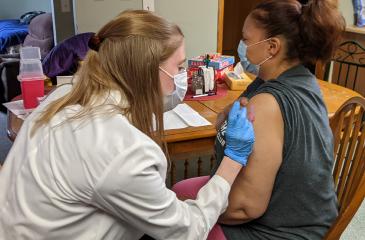Tomorrow we mark a significant anniversary: one year since the first case of COVID-19 was diagnosed in Minnesota. One week later, March 13, Governor Walz declared a state of emergency, and by March 18 the entire landscape of our lives had changed.
Although it was a year of reversal, it was at the same time a year of extraordinary courage, innovation, compassion, and commitment. The fact that we already have not one, but three vaccines is a truly remarkable achievement. By June of this year, 700 million doses will have been made available to U.S. adults, enough for everyone who wants it. Enough to turn the tide of this pandemic.
Here are some of the ways our health sciences are working together to ensure those vaccines are equitably accessed, people are better educated about them, and that obstacles to vaccination can be addressed and minimized in a culturally sensitive way.
- The interprofessional Disparities in COVID-19 Task Force is partnering with local community organizations to provide education and increase vaccine confidence.
- The Medical Reserve Corps has developed a COVID-19 vaccination team to support vaccine clinic operations, including managing client flow, assisting with logistics and supplies, and providing vaccinations.
- “COVID-19 Vaccine and Pandemic Planning” is a recently launched six-week online interprofessional course for health science learners. Nearly 300 students are already enrolled from multiple campuses and disciplines at both the undergraduate and graduate level.
- Mini Medical School: COVID-19: The Way Forward focused on vaccines, health equity, and long COVID. Webinar sessions, attended by over a thousand people from across campus and beyond, can be viewed online.
Thank you for all your efforts toward ending this pandemic and keeping each other safe.
Jakub Tolar, MD, PhD
Vice President for Clinical Affairs
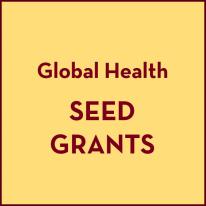
CLINICAL IPE TRAINING NEWS
Global Health Seed Grants RFP Released
The Center for Global Health and Social Responsibility requests proposals for Seed Grant awards up to $25,000 to catalyze innovative global health research projects, particularly in Africa, Asia, and Latin America/Caribbean. Interested applicants should submit a letter of intent by April 30. More information can be found on CGHSR's website.
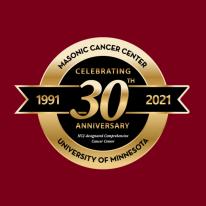
CLINICAL RESEARCH NEWS
Masonic Cancer Center Celebrates 30th Year of Championing Cancer Research
For 30 years, the Masonic Cancer Center has served as the hub for cancer research at the University of Minnesota. During that time the Masonic Cancer Center has been at the forefront of cancer research and care, benefitting not only Minnesotans but people around the world. Taking cutting-edge science from the lab bench to the exam room, the researchers and doctors at the Masonic Cancer Center have saved countless lives, influenced life-saving legislation, and brought about more tomorrows for cancer patients and their families.
“We bring together experts from all over the University to tackle cancer from every angle,” said Douglas Yee, MD, director of the Masonic Cancer Center. “Basic science researchers collaborate to understand what drives cancers. Population scientists examine the factors associated with cancer risk. Then our clinical investigators meet with members to develop strategies to connect the dots in screening, prevention, treatment, and survivorship of the major disease types. And community experts advise and recommend strategies to address the unique research and care needs of the diverse populations of Minnesotans. This is truly bench to bedside research and we are leading the way.”
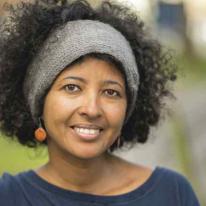
U-WIDE EVENTS AND OPPORTUNITIES
Obstetric Fistula: A Window into Disparities in Women's Health and A Call for Reimagining Global Health Engagements
Rahel Nardos, MD, MCR, director of global women’s health in the Center for Global Health and Social Responsibility, will present, “Obstetric Fistula: A Window into Disparities in Women's Health and A Call for Reimagining Global Health Engagements” on March 10. She will discuss the state of maternal health globally using obstetric fistula as a window into the vast inequities in maternal outcomes. She will also highlight the structural and social determinants of disparities in maternal health and put forth a call to action for meaningful and impactful engagement. This seminar is part of the Gender, COVID-19, and Human Rights webinar series.
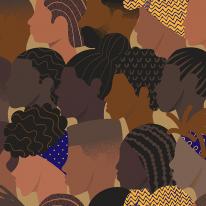
Overcoming Racism’s Power to Undermine Health
Due to racism, individuals who are Black, Indigenous, and people of color experience ill health and death rates that exceed their white counterparts, often by large margins. To dramatically change that picture, Blue Cross and Blue Shield of Minnesota has made a $5 million gift to the School of Public Health to establish the Center for Antiracism Research for Health Equity, a vision created by Associate Professor Rachel Hardeman who will serve as its founding director. Learn more about this ground-breaking initiative by watching the video and reading the fact sheet and press release about the center.
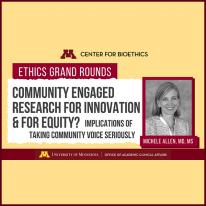
Community Engaged Research for Innovation and for Equity? Implications of Taking Community Voice Seriously
Join the Center for Bioethics for their upcoming grand rounds on March 19. Community Engaged Research (CER) has become a priority for funders to increase representation in clinical trials and address health disparities. CER contributes to health innovations by bringing the perspectives of end-users - those most impacted by health inequities – into the research process. However, CER does not necessarily lead to improved health equity or trust in the research process. In this talk, Michele Allen, MD, MS, will describe tension points between research and community perspectives when we take community voice seriously regarding our routine ways of conceptualizing, conducting, and disseminating research.
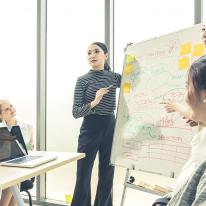
Project REACH
Project REACH (Rural Experts Advancing Community Health) is a year-long program that provides diverse community leaders in rural Minnesota with health policy and leadership training. Participants will learn to frame health policy challenges and how to communicate effectively with state legislators and other policymakers. Applicants are required to fill out an interest form by 5pm, March 31 as the first step of the application process.
